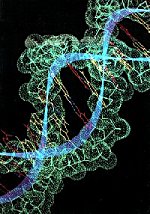 The budget for the Human Genome Project and all that post-genomic, proteomic, metabonomic, immunomic…research was almost on a par with defense spending; it was almost c-omical really. Well, maybe not quite, but it stretches out with a lot of zeros nevertheless. At the time the grants were written and the funding given, we, as a society, were promised all kinds of medical miracles from gene therapies and new treatments to cure all those nasties – cystic fibrosis, sickle cell, thalassemia, cancer, heart disease and more.
The budget for the Human Genome Project and all that post-genomic, proteomic, metabonomic, immunomic…research was almost on a par with defense spending; it was almost c-omical really. Well, maybe not quite, but it stretches out with a lot of zeros nevertheless. At the time the grants were written and the funding given, we, as a society, were promised all kinds of medical miracles from gene therapies and new treatments to cure all those nasties – cystic fibrosis, sickle cell, thalassemia, cancer, heart disease and more.
We were promised personal medicine courtesy of pharmacogenomics. This would allow your doctor to profile your genome and tailor your medication to the particular set of enzymes running in your liver and whether or not you were likely to respond positively, suffer adverse effects, or simply not respond at all. We have even seen, this last few days, the sequencing of James Watson’s genome; an effort that cost less than $1m and took under four months. But do any of these promises add up to very much beyond myriad PhD theses and thousands of biotech startups many of which have already crashed?
Hopefully, the answer is yes. In the next few years, gene science will hit pay dirt as genes finally give up their real secrets and the true meaning of so-called junk DNA will become clear. Our understanding and ability to treat a wide range of disease from breast cancer and obesity to hypertension and bipolar disorder will come of age and perhaps finally succumb to all this genetic scrutiny and manipulation.
Nature, Science and the Wellcome Trust provided a useful summary of the genetic state of the art for a recent Times report by Mark Henderson on our genetic future. In the summary Henderson highlighted the latest “in press” results, most of which are now online, so I am providing here the hyperlinked executive summary:
Breast cancer – Three papers published in Nature and Nature Genetics at the end of May reported four new genes and one genomic region associated with increased risk. 10.1038/nature05887, 10.1038/ng2075, 10.1038/ng2064
Obesity – An obesity gene, the FTO gene, was published in Science in April and reported in Sciencebase at the time.
Diabetes – Again in Science (and 10.1126/science.1142382 and 10.1126/science.1142358, three common genes for increased diabetes type 2 risk were reported, bringing the total known genes associated with diabetes to nine.
Alzheimer’s disease – New results also published this week in Neuron discuss an Alzheimer’s gene
Data that were still under press embargo at the time Henderson’s feature appeared in The Times, however, meaning he could only hint at the true potential of human genome results were revealed today.
The largest ever study of genetics of common diseases in which almost 10 billion pieces of genetic information were analysed were published just one minute ago, so I can now outline the findings in a little detail. The new study compared 2000 cases each of seven common diseases with 3000 shared control patients, and reveals new genetic associations with these disorders. A pair of related papers in Nature Genetics (a and b) offer further insights into two of the seven diseases investigated.
In the Nature article, scientists from the Wellcome Trust Case Control Consortium report genetic variants associated with the development of bipolar disorder, Crohn’s disease, coronary heart disease, type 1 and type 2 diabetes, rheumatoid arthritis and hypertension. This is the first study from this large scope and it, the scientists found one genetic region newly associated with bipolar disorder, and another with coronary artery disease. A separate group of three markers have been found to be associated with rheumatoid arthritis. The researchers also identify nine new genetic associations for Crohn’s disease and ten chromosome regions that contain genes related to diabetes.
These new results would suggest a medical revolution is at hand and that the Human Genome Project and its spinoff -omics really are about to hit pay dirt. But, are we really on the verge of a new era in medicine, or are the various genetic revelations simply more grant-baiting hyperbole?